Interview Questions for Teachers: A Comprehensive Preparation Guide

Entering a teaching career is more than just landing a job; it’s about stepping into a role where you will inspire, guide, and impact lives daily. Before entering the classroom, there is one important step you need to deal with, and that is the interview. A teaching interview is your chance to show your dedication to the role. The interview can feel daunting, but you can ace it with some preparation. In this comprehensive preparation guide, we will cover:
- Key questions you can expect.
- Tips to tackle the questions.
Interview questions can range from anything about your personality to your teaching methods. To help you prepare well before the interview, the following is a list of questions that you can expect in your teaching interview.
Personal Teacher Interview Questions and Tips
Personal interview questions give a unique opportunity to showcase the passion behind the teaching journey. Interviewers do not just want to see someone with good knowledge and grip on the curriculum; they want someone who brings passion, empathy, and dedication to their students daily.
The following are the personal interview questions that teachers mostly get asked and tips for tackling these questions smartly.
What Made You Decide to Become a Teacher?
This question offers teachers a chance to give their unique perspective on what fueled their journey to become a teacher. It is a chance to share your story behind your career and communicate your core values and motivations.
Tips to Answer
In response to this question, teachers should highlight the moments and people that inspired their journey. You can also mention the impactful interaction you had with teachers that fueled your entry into this profession.
Teachers should also talk about their purpose and mission in this profession. Expressing clear and thoughtful goals will also help you foster students’ confidence. To prepare for this question, you can jot down a few long-term goals and actions that you plan to take to reach them.
Answering this question should give the interviewer an idea of why you chose teaching and how you plan to make a difference while in your field. Working on your answers before the interview will help you answer them with clarity and conviction.
Describe a Situation Where You Solved a Problem in a Team.
Teamwork is an essential skill that teachers need to have, as their job requires them to interact with different people and contribute to schoolwide initiatives that impact a larger community. Interviewers usually ask this question as they want to see how effectively you can collaborate, communicate, and contribute to the shared goals.
Tips to Answer
To answer this question, you should choose a situation where teamwork was the way to get through the challenging situation. Start by describing the team's problem, whether it is related to student engagement initiatives, implementing a new curriculum, or addressing an issue of student behavior.
Explaining the context will help the interviewer understand the complexity and nature of the problem you faced. Then, you will go into the details and highlight all the steps that you took in collaboration with your team to solve this issue. Highlight strategies and problem-solving techniques you used, as it will give the interviewer an understanding of your role in the strategy and teamwork.
You should also highlight any particular role that you took to make the project move forward. This will highlight your ability to collaborate with other team members and stay focused on a common goal. Finally, discuss the outcome, as summing up with a positive result can show the interviewer that you are a proactive team player.
What is Your Greatest Strength?
When interviewers ask about your greatest strength, they give you a chance to showcase the qualities that make you the ideal fit for school. This question is about confidently presenting the strengths that set you apart as a teacher.
Tips to Answer
Before the interview, prepare well and identify your top strengths. You can start by reflecting on your recent successes at work or any positive feedback that you received from a supervisor. Once you have pinpointed these strengths, choose the one strength that best aligns with the teaching role you are currently applying for.
If you have been complimented for being an excellent communicator, talk about how this strength helps you facilitate discussions and maintain strong connections with both students and parents. For instance, you can mention an instance where your communication helped you better collaborate with parents.
Presenting a real-life example while talking about your strengths will make your answer more engaging and show the interviewer that you are a self-aware educator who best uses your strengths to benefit students.
What is Your Biggest Weakness?
This question gives you a chance to show your interviewer that you are an honest and self-aware person. Everyone has an area of improvement, and the key here is to address this weakness in a way that highlights your commitment to grow in your career and personal life.
Tips to Answer
You can start answering this question by highlighting an area that is genuinely challenging for you as a teacher, but be selective. Choose a weakness that does not undermine your capability for the position but rather reflects something that you are actively trying to improve. For instance, you may find it challenging to delegate tasks and thus struggle with work-life balance.
After identifying your weakness, you should shift the focus toward the steps you are actively taking to improve this weakness. You should also share the progress of your efforts for improvement. By highlighting your efforts to overcome the weakness, you are showcasing a growth mindset and dedication to add value to the school.
Interview Questions About Teaching Methods
When it comes to teaching, teaching methods are equally important to content. Interviewers ask about your teaching methods to understand the strategy and philosophy behind your teaching. These questions will give you a chance to talk about your teaching style.
This is an opportunity for you to show that your methods are not like any routine methods; they are adaptable approaches designed to maximize student growth and classroom success. Below are some common teaching method questions and tips to answer them.
How Do You Identify and Address Learning Disabilities?
When interviewers ask about identifying and addressing learning disabilities, they want to know if you understand the common signs and how you will be able to adjust your teaching style to meet diverse needs.
Tips to Answer
In response to this question, it is helpful to demonstrate your knowledge about common learning disabilities like Dyslexia and ADHD. This will help interviewers understand if you are able to identify these based on early signs. You should also talk about the importance of regularly monitoring students' progress.
You can also talk about group activities and tasks that will provide targeted support to these students. Including concrete examples will show that you not only possess the knowledge about these problems but also actively realize the individual learning needs and take proactive steps to help each student.
What is Your Teaching Philosophy?
Questions about teaching philosophy are designed to uncover core beliefs as a teacher. It will help the interviewer judge your approach and how you see your role in shaping young minds. The goal of this question is to see how you bring those beliefs into action when in the classroom.
Tips to Answer
Begin answering by reflecting on the bigger picture of your discipline. Why is your subject meaningful? What impact does it create on a higher level? This is your chance to communicate the value you place and what role you play in shaping students’ growth.
Once you have outlined your beliefs, talk about how you put this philosophy into practice. Specify teaching methods that support your philosophy and illustrate the “how” of your approach. Explain how you balance formative and summative assessments to check for understanding and help students grow.
How Will You Manage Your Classroom?
When interviewers ask these questions, they are interested in discipline and your specific approach to fostering a respectful, organized, and engaging classroom for all students. Your answer to this question can show that you can teach your subject and lead students with patience and consistency.
Tips to Answer
This question may be an interviewer’s way to gauge your approach to discipline - are you more of a strict rule-enforcer or a flexible mentor? You can include examples to justify yoru approach. Including examples will give the interviewer a way to understand your approach based on a real-life scenario.
For specific techniques, think about the age and needs of the students you will be teaching. Elementary school students might benefit from visual cues, while high school students may respond better to self-directed expectations. Also, remember to research the school’s approach and describe how your methods align with it. This helps the interviewer integrate you well into the school community and get overall positive feedback for your interview.
Interview Questions About Fostering Connections
Successful teaching goes way beyond just delivering the curriculum; it involves building trust and genuine relationships with your students and the overall community. Teachers who can connect with students make the classroom culture more inclusive. In such questions, teachers can talk about their approach to social aspects of teaching, be it interacting with students or parents.
What is Your Method of Dealing with Difficult Parents?
Addressing concerns from parents, especially when they are upset, is an important part of the teacher’s role. The question allows you to demonstrate the ability to navigate sensitive situations with understanding, patience, and focus on problem-solving. The interviewer wants to know if you can keep interactions positive by asking this question.
Tips to Answer
When dealing with difficult conversations, focus on active learning and empathy, which are the first steps. You should start by showing your understanding of the parents’ concerns and make sure that you are on the same page.
Next, you should outline how you will invite parents to collaborate on solutions, involving them in the process of setting goals for the child’s growth and deciding on the best way forward.
How do You Build Strong Relationships with Your Students?
Establishing positive connections with students is key to an effective classroom and a productive learning environment. When asked about relationships, you are given the opportunity to share how you will create a welcoming atmosphere for your students. The interviewer wants to gauge how well you can work towards building trust and respect in the classroom.
Tips to Answer
You can start by describing the steps you take to create a welcoming atmosphere for your students. For instance, meeting students at the door with a friendly greeting can set a positive tone for students’ moods. Explain the simple actions that help make students feel valued and understood.
Highlight how you maintain these relationships by having one-on-one check-ins to connect with students individually. This shows that you view your students as individuals and are there to support their unique needs. Emphasize on how you address issues empathetically, using language that helps students reflect on their actions without feeling judged.
How Important are Inclusion Initiatives to You?
For today’s teachers, fostering inclusion is very important. These DEI initiatives are not just policies; they are to ensure all students feel respected and supported in the classroom. The interviewer wants to see your unique approach to building a classroom culture that embraces every student’s identity.
Tips to Answer
Begin answering this question by discussing your teaching philosophy. You have to explain how inclusion helps students study in a positive atmosphere. Mention that you view DEI as a means to honor each student's individuality who is coming together to be a part of this classroom.
Share specific examples of your commitment to complex topics related to race, gender, and socioeconomic differences. This shows that you are prepared to engage in meaningful conversations to foster respect among students.
How to Prepare for a Teacher Interview: Comprehensive Tips
A successful teaching interview is much more than just having good answers to the most common questions. By preparing well for the interview, you will be able to stand out in this competitive field. Here are some key steps to help you excel in your upcoming teacher interview.
Research About School
Start your research by getting to know the school you are interviewing for. Have a look at the website and social media channels to understand the school’s values and reputation. Knowing these details allows you to frame your responses in ways that align with the school’s identity.
Practice Potential Responses
You should also practice your potential responses, as it will help you answer confidently in the actual interview. Consider preparing responses to common questions, and practicing them out loud can help you refine your answers to sound natural.
Bring a Portfolio
A portfolio is a snapshot of your accomplishments and teaching methods. Fill it with lesson plans and creative teaching aids or any other earned awards and certifications. Having these materials on hand will not only show the interviewer what you bring to the table but also give you the points to talk about your impact in past roles.
Show up prepared
First impressions matter, and your appearance speaks volumes about your professionalism. Choose an attire that is both professional and comfortable, allowing you to feel confident and focused. Plan to arrive 10 minutes early; this will give you time to take calming breaths and mentally prepare for the interview.
Stay Positive
A positive demeanor can influence the entire mood of the interview. Smile, make eye contact, and engage actively with each question, showing the interviewer that you are genuinely excited about teaching and working with your students. The energy you project during the interview is likely how you will present yourself to students and staff.
Conclusion
Preparing for a teacher interview is about showcasing your dedication to align with the school’s mission and confidently presenting yourself. By researching about the school, practicing responses, bringing a portfolio, and projecting positivity, you can stand out as a candidate and make an impact.




